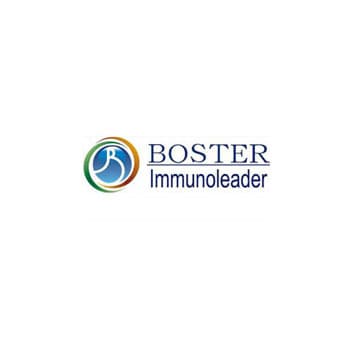
Supplier:
BOSTER IMMUNOLEADERCat no: PA2061
Polyclonal Anti-F8
Prices direct from BOSTER IMMUNOLEADER
Quick response times
Exclusive Biosave savings/discounts
SPECIFICATIONS
Price
200.00 USD
Catalog Number
PA2061
Size
100ug/vial
Applications
WB
Reactivities
Hum
Form
Lyophilized
Format
Each vial contains 5mg BSA, 0.9mg NaCl, 0.2mg Na2HPO4, 0.05mg Thimerosal, 0.05mg NaN3.
Gene Id
F8
References
1. Hoyer, L. W. Hemophilia A. New Eng. J. Med. 330: 38-45, 1994.\n2. Tantravahi, U., Murty, V. V. V. S., Jhanwar, S. C., Toole, J. J., Woozney, J. M., Chaganti, R. S. K., Latt, S. A. Physical mapping of the factor VIII gene proximal to two polymorphic DNA probes in human chromosome band Xq28: implications for factor VIII gene segregation analysis. Cytogenet. Cell Genet. 42: 75-79, 1986.\n3. Toole, J. J., Knopf, J. L., Wozney, J. M., Sultzman, L. A., Buecker, J. L., Pittman, D. D., Kaufman, R. J., Brown, E., Shoemaker, C., Orr, E. C., Amphlett, G. W., Foster, W. B., Coe, M. L., Knutson, G. J., Fass, D. N., Hewick, R. M. Molecular cloning of a cDNA encoding human antihaemophilic factor. Nature 312: 342-347, 1984.
Swiss Prot
P00451
Storage Temp
At -20 degree C for one year. After reconstitution, at 4 degree C for one month. It can also be aliquotted and stored frozen at -20 degree C for a longer time.Avoid repeated freezing and thawing.
Additional Info
A synthetic peptide corresponding to a sequence in the middle region of human F8.
Scientific Background
Coagulation Factor VIII (FVIII) is an essential blood-clotting protein, also known as anti-hemophilic factor (AHF). By in situ hybridization, Tantravahi et al. (1986) concluded that the F8 gene is located in the proximal part of chromosome Xq28 with probes DX13 and St14 distally located. The F8 gene encodes coagulation factor VIII, a large plasma glycoprotein that functions in the blood coagulation cascade as a cofactor for the factor IXa-dependent activation of factor X (F10). Factor VIII is activated proteolytically by a variety of coagulation enzymes, including thrombin (F2). Factor VIII is tightly associated in the blood with von Willebrand factor (VWF), which serves as a protective carrier protein for factor VIII (Toole et al., 1984; Hoyer, 1994).
More from BOSTER IMMUNOLEADER
Applications
IHC, WB
Reactivities
Hum
Applications
IHC, WB
Reactivities
Mouse, Rat
Applications
ELISA, WB
Reactivities
Mouse
Applications
WB
Reactivities
Hum, Mouse, Rat
Applications
IHC, WB
Reactivities
Hum
Latest promotions
Spend less time on DNA cleanup so you can do more science. The MSB Spin PCRapace is the fastest way to purify your DNA from PCR, restriction digestion, and...
New brilliant antibodies, and new lower prices!For flow cytometry reagents in general, \"bright is better.\" The violet-excitable BD Horizon™ BV421 and...
As an incentive to qualify our BSA, we are offering a 20% discount when you purchase your first 100g, 500g or 1000g of any grade of Bovine Serum Albumin....
It is not every day that you are given something for nothing. We are giving away additional spectrophotometer software.Cecil Instruments have enhanced the...
We're so sure that you'll prefer Cayman Assay kits over your present brand that we're willing to give you a free assay kit to prove it!
10% Discount on 2 Rabbit Polyclonal Antibody Service. With over 20 years experience, SDIX has developed into the premier US custom antibody producer,...
For the past decade scientists have extensively used ATS secondary toxin conjugates to make their own targeted toxins for in vitro use.The ability to combine...
Did your supplier increase the price of Fetal Bovine Serum? Did they substitute the US Origin with USDA? Well say no more! Innovative Research is still...
Bulk Cytokines with Custom Vialing.20 - 50% off cytokines, growth factors, chemokines and more...For a limited time Cell Sciences is offering substantial...
Jenway’s 73 series spectrophotometer range provides four models with a narrow spectral bandwidth of 5nm and an absorbance range of –0.3 to 2.5A,...
Are you planning to have a customised antibody made for your research?Since 2000, Everest has been producing a catalog containing thousands of affinity...
Top suppliers
United States Biological
230753 products
Carl Zeiss Microscopy
27 products
Promega Corporation
11 products
Panasonic Healthcare Company
5 products
Life Technologies
1 products
Nikon Instruments Europe
11 products
Olympus Europa Holding GmbH
3 products
Leica Microsystems, Inc.
10 products
GE Healthcare Life Sciences
2 products
Tecan Trading AG
19 products
Beckman Coulter, Inc.
1 products
AB SCIEX
3 products
BD (Becton, Dickinson and Company)
1 products
RANDOX TOXICOLOGY
5 products
Randox Food Diagnostics
6 products


















